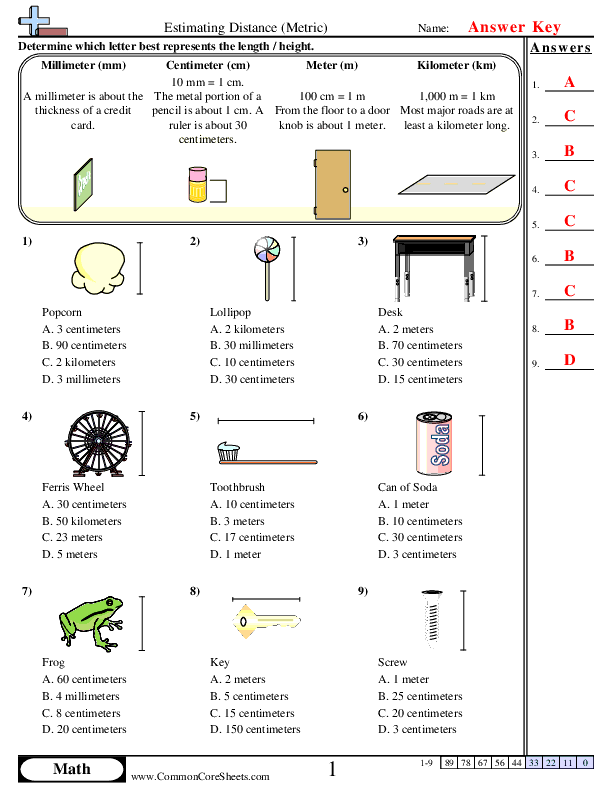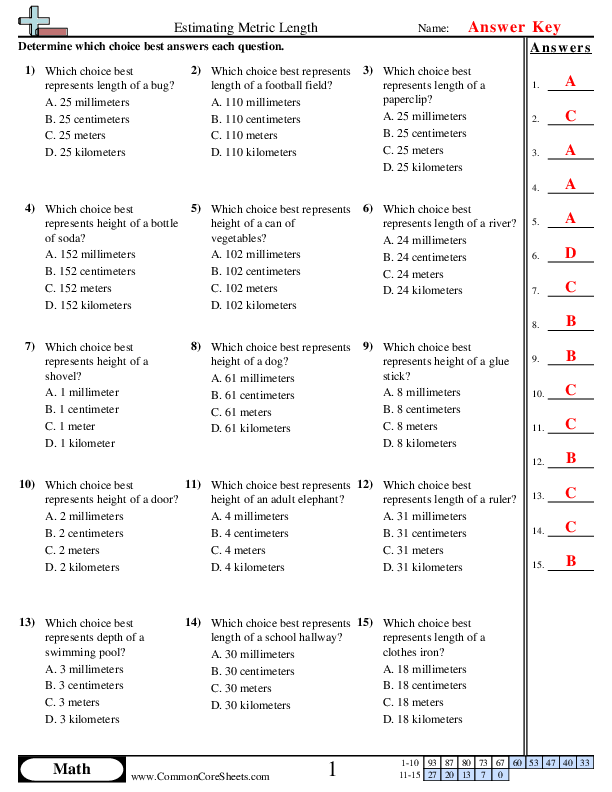Looking for the best measurement worksheets on the internet? Look no further! Our measurement worksheets are designed to help students of all ages learn and practice the important skill of measurement. From length and weight to volume and capacity, our worksheets cover a wide range of topics to ensure a well-rounded understanding of measurement concepts. And the best part? They're all free! Simply download and print as many copies as you need for your classroom or home use. These measurement worksheets are a great resource for teachers, students, and parents looking to improve their measurement skills. Try them out today and see the difference they can make in your understanding of measurement.
Browse Sheets By Problem Type
×

Estimating Length (American)
4md1


×
Description:
"This worksheet is designed to improve children's estimation of distances in a fun and interactive manner. Covering a wide range of objects, from skateboards to frogs, the activities engage learners through nine diverse math problems. Customizable to different learning needs, this worksheet can be converted into flash cards or suitably adapted for distance learning, ensuring flexibility in teaching methods while solidifying essential mathematical concepts."

×
Student Goals:
Understanding of MeasurementsUpon completion of the 'Estimating Distance' worksheet, students should have a developed understanding of the various units of measurement used in the American system. These include inches, feet, yards, and miles, and students will become familiar with their relative lengths and everyday uses.Estimation SkillsThe worksheet is designed to improve the practical estimation skills of students. Faced with objects and distances of various sizes, students should learn how to make quick yet accurate approximate evaluations of distances and sizes using known benchmarks. Thus, sharpening their mental estimation skills.Real-World ApplicationsAfter completing this worksheet, learners should have a clearer understanding of how these units of measurement are applied in real-world contexts. By relating commonly known objects in their estimation exercises, students gain insights into real-world applications of measurements.Critical ThinkingStudents will also enhance their critical thinking skills through the course of completing the worksheet. With every problem, students are required to consider the size and scale of the objects and distances involved, and to select the most appropriate unit of measurement. This encourages concept analysis and strategic thinking.Confidence BuildingFinally, successfully completing the worksheet should boost the students' confidence in their mathematical abilities. Not only will they have a stronger grasp of American measurement units, but they will also have refined their estimation and reasoning abilities. This increased confidence can inspire a more positive attitude towards learning math and related subjects.



Determining Appropriate Measurement (American)
4md1


×
Description:
"This worksheet is designed to teach math through the concept of estimating American lengths. From social objects to natural wonders, the tasks encourage children to familiarize themselves with measurements like inches, feet, yards, and miles. It features 15 problems and can be easily customized, converted into flashcards, or used for distance learning, making it versatile for various teaching methods and environments."

×
Student Goals:
Measurement UnderstandingUpon successful completion of this worksheet, students will develop a solid understanding of the American length measurement units including inches, feet, yards, and miles, and the relative differences between them. They will gain insight into making educated estimations on the lengths and heights of everyday objects and elements of the natural world.Estimation SkillsStudents will develop valuable estimation skills which are critical not only in the subject of math, but throughout various aspects of life. They will become comfortable with making an educated guess or estimate, which can be a valuable problem-solving tool when precise information is unavailable.Real-World ApplicationsThe completion of this worksheet will enable students to apply their learning into real-world contexts. By relating the problems to everyday items like a can of soda or a skateboard, they will be able to visualize and grasp the concept of length estimation better. This understanding will transfer to their ability to approximate and compare distances in real-life situations.Critical ThinkingThis worksheet fosters critical thinking by encouraging students to use their knowledge of measurement units to evaluate and choose the most reasonable answer out of multiple choices. This skill of critically evaluating multiple potential solutions will benefit them in future mathematical problems as well as in wider life situations.Builds ConfidenceBy systematically developing an understanding and honing their estimation skills, students will gain confidence in handling problems related to length measurement. They will become capable of making quick estimations in their head and develop a sense of achievement in their mathematical abilities.Promotes Active LearningFinally, since the learning is couched within the framework of practical, real-life objects and situations, students are motivated to actively engage with the content. This active involvement in their own learning process can lead to a deeper understanding of the subject and improved academic performance in the long run.



Estimating Length (Metric)
4md1


×
Description:
"This worksheet is designed to enhance children's mathematical skill in estimating distances using the metric system. Comprising nine problem sets, it employs everyday items, from shovels to envelopes, to facilitate comprehension. Perfect for distance learning, these problems can be converted into customizable flashcards for effective learning and easy recall."

×
Student Goals:
Understand Distance MeasurementAfter successfully completing this worksheet, students should attain a comprehensive mastery of distance measurements in metric units. They should be able to recognize and differentiate between millimeters, centimeters, meters, and kilometers, understanding how they relate to each other and how they are used to represent lengths and distances in the real world.Estimating TechniquesFurthermore, students will develop the skill to make accurate estimations. They will be able to gauge the distances of various everyday items without employing measuring instruments, based on their understanding of the comparative lengths of different metric units. Hence, they will understand the application of these units in day-to-day scenarios.Critical Thinking and Problem SolvingWith the knowledge obtained from the worksheet, students should be equipped with better problem-solving and critical thinking abilities. They will be capable of making smart choices from provided options in estimating the length or distance of things. This will be especially useful in instances where precision measuring tools are not readily accessible.Application to Real-life ContextsFinally, students should be able to apply the skills learned in practical real-world contexts. They will understand that the same methods used in estimating the length of a glue stick, or the distance covered in a trip, can be used to solve more complex mathematical problems.Relevance in Other Subject AreasThis knowledge will be useful in overcoming challenges not only in Math but also in other subjects that require measurements such as Science and Geography. For instance, having a good grasp of distances could aid in the study of habitats or geographical features.Build ConfidenceCompletion of the worksheet can build confidence in students, as they would be able to see that mathematics and measurements are concepts that they can grasp and use in their everyday lives. This could lead to a deeper interest in math and other related subjects, encouraging them to explore these further.



Determining Appropriate Measurement (Metric)
4md1


×
Description:
"This worksheet is designed to help children practice estimation of metric lengths. It offers 15 mathematical problems dealing with real-world objects, varying from daily household items to larger landscapes, to improve the grasp of metric units. This versatile aid can be customized based on a learner's level, transformed into flashcards for revision, or incorporated into distance learning curriculums to effectively and engagingly teach metric length estimation."

×
Student Goals:
Understanding of Metric UnitsAfter completing the worksheet, students should have gained a clear understanding of various metric units of length such as millimeters, centimeters, meters, and kilometers. They will also comprehend how these units relate to real-world objects, enhancing their understanding of metric scales.Problem Solving SkillsThe worksheet aims to enhance critical thinking and problem-solving skills in a student. As they navigate through the problems, they are encouraged to make logical decisions on what metric units best represent the given objects—thus, equipping them with fundamental problem-solving abilities.Practical Application of Math ConceptsPost worksheet completion, students should be able to apply the mathematical concepts learned in practical scenarios. They will be equipped to estimate and measure lengths of various objects around them accurately using the correct metric units.Conceptual KnowledgeStudents will also assimilate conceptual knowledge about the size and scale of everyday items, which will be beneficial not only in their mathematical journey but also in general cognitive development. They will understand the typical length of objects, their comparison, and get a sense of spatial awareness.Improved Estimation SkillsThe worksheet is designed to help students significantly improve their estimation skills. By solving problems that involve estimating the length of various items, students will develop a better sense of judgment. They will learn to make accurate estimates, a skill that is essential in many areas of life beyond math.Strengthens Logical ReasoningUpon completion, students should exhibit improved mental agility and logical reasoning. Probing the metric length of everyday objects and comparing choices demands regular practice for cognitive development, which in turn strengthens their logical reasoning skills.Confidence in Handling MeasurementsStudents will attain familiarity and confidence in dealing with measurements in their day-to-day encounter. By linking realistic objects to measurements, theoretical concepts of metrics and measurements become more approachable and less abstract.



Conversion Tables
4md1


×
Description:
"This worksheet is designed to enhance children's math skills, focusing on the method of converting tables. Comprising 20 problems ranging from base to complex numbers, it reinforces the fundamentals of number conversion. Each problem can be customized, transformed into flashcards for hands-on learning or incorporated into distance education modules. A brilliant tool to make learning fun and effective!"

×
Student Goals:
Enhance Mathematical SkillsUpon completion of the 'Converting Tables' worksheet, students should have significantly improved their mathematical skills. Complex concepts are simplified into understandable chunks, allowing young learners to grasp them easily. This foundational comprehension can make subsequent topics easier to understand.Improve Problem-Solving AbilitiesThis math worksheet is designed to enhance problem-solving abilities in children. The various problems provided prompt students to apply conventionally learned strategies in order to find solutions, developing their ability to think critically and independently.Develop Analytical SkillsUsing this worksheet, students should be able to cultivate their analytical skills. They learn how to examine a problem, analyze the information provided, plan a solving strategy, and critically review their results. This development is crucial not only in tackling math problems but also in everyday scenarios.Boost Confidence & ResilienceThe process of tackling and successfully finishing the worksheet tasks can boost a student's confidence in their own abilities. Additionally, they learn that it is okay to make mistakes, as they are a part of learning—a concept that builds resilience.Enhance Cognitive SkillsChildren's cognitive skills are improved as they manipulate numbers, apply formulas, and uncover patterns through these worksheets. They will not only understand the 'how' but also the 'why' behind solving these questions, which promotes higher-level thinking.Promote the Love for NumbersThis worksheet paves the way for students to develop a lifelong love and appreciation for numbers. By gradually solving these problems and understanding core concepts, maths becomes less intimidating and more appealing.Prepare for Advanced TopicsThe completion of this worksheet implies the foundation necessary for more advanced mathematical concepts has been set. It prepares the students for future topics, both in terms of concepts and the confidence to tackle difficult problems.







